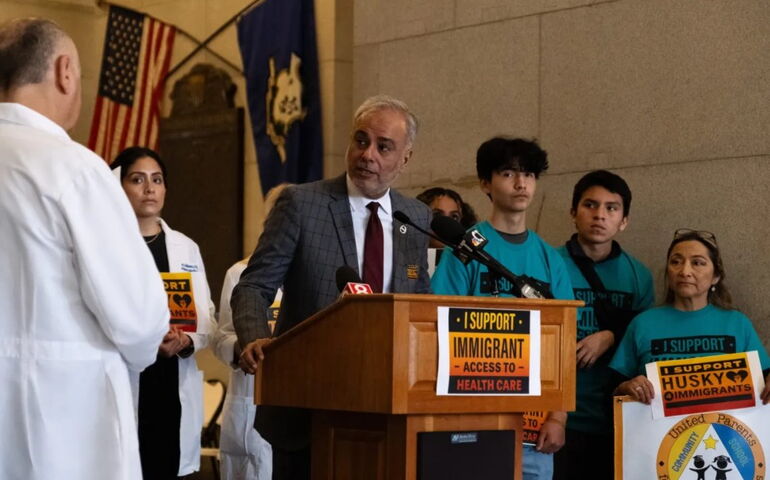Processing Your Payment
Please do not leave this page until complete. This can take a few moments.
-
News
-
Editions
-
- Lists
-
Viewpoints
-
HBJ Events
-
Event Info
- 2024 Economic Outlook Webinar Presented by: NBT Bank
- Best Places to Work in Connecticut 2024
- Top 25 Women In Business Awards 2024
- Connecticut's Family Business Awards 2024
- What's Your Story? A Small Business Giveaway 2024 Presented By: Torrington Savings Bank
- 40 Under Forty Awards 2024
- C-Suite and Lifetime Achievement Awards 2024
- Connecticut's Health Care Heroes Awards 2024
-
-
Business Calendar
-
Custom Content
- News
-
Editions
View Digital Editions
Biweekly Issues
- April 29, 2024
- April 15, 2024
- April 1, 2024
- March 18, 2024
- March 4, 2024
- February 19, 2024
- February 5, 2024
- January 22, 2024
- January 8, 2024
- + More
Special Editions
- Lists
- Viewpoints
-
HBJ Events
Event Info
- View all Events
- 2024 Economic Outlook Webinar Presented by: NBT Bank
- Best Places to Work in Connecticut 2024
- Top 25 Women In Business Awards 2024
- Connecticut's Family Business Awards 2024
- What's Your Story? A Small Business Giveaway 2024 Presented By: Torrington Savings Bank
- 40 Under Forty Awards 2024
- C-Suite and Lifetime Achievement Awards 2024
- Connecticut's Health Care Heroes Awards 2024
Award Honorees
- Business Calendar
- Custom Content
A year after launch, ‘HUSKY for immigrants’ sees strong demand
 SHAHRZAD RASEKH / CT MIRROR
Sen. Saud Anwar speaks at a rally supporting HUSKY for immigrants at the Capitol on April 18, 2024.
SHAHRZAD RASEKH / CT MIRROR
Sen. Saud Anwar speaks at a rally supporting HUSKY for immigrants at the Capitol on April 18, 2024.
A Connecticut law expanding state-sponsored insurance coverage to certain children regardless of immigration status has seen explosive demand since it went into effect nearly 14 months ago.
More than 11,000 children 12 and under who wouldn’t otherwise qualify for Medicaid because of their immigration status now receive state-sponsored Medicaid-like coverage. Before the measure went into effect in January 2023, the Department of Social Services, or DSS, estimated that roughly 4,250 kids would enroll.
“Sometimes there is trepidation on the part, especially of non-citizens, to participate in government programs,” said Peter Hadler, the deputy commissioner at DSS. “The good news is that that has not proven to be a barrier, and people are enrolling at strong rates, and they’re seeking this out.”
Hadler credits the high enrollment in large part to the work that community partners have done to spread the word and make people feel comfortable enrolling.
The coverage expansion has also gone beyond just children. In April 2022, pregnant people regardless of immigration status became eligible for prenatal coverage and, the following year, that was expanded to also include 12 months of postpartum coverage.
As of January 2024, 1,900 residents who wouldn’t otherwise qualify based on their immigration status were enrolled in prenatal coverage and roughly 2,000 were enrolled in postpartum coverage.
Since the expansion, Bianca Noroñas, the director of the Maternal Health Center at the Hispanic Health Council, said she no longer sees patients skipping appointments for fear of the cost.
“We have seen the difference. Now the families don’t have these economic concerns when they need to go to prenatal visits,” she said. She’s also seeing patients take advantage of the coverage during pregnancy and postpartum to address other health needs, like dental work and mental health care.
In general, advocates said they’re pleased with the number of people enrolling in coverage and appreciate how collaborative DSS has been since the rollout. But they say they won’t be satisfied until they achieve coverage for everyone, regardless of immigration status.
“Health care is a fundamental human right, and no one should be denied access based on immigration status,” said Luis Luna, a manager with the HUSKY 4 Immigrants Coalition, during a rally at the State Capitol this week. “Our message is very clear. Connecticut must act decisively, and it must act now.”
Currently, California, Oregon and the District of Columbia extend coverage to people of any age regardless of immigration status, according to a feasibility study conducted by the Office of Health Strategy. At least eight states, including New York, Maine, and Vermont, provide comprehensive state-funded coverage to all children. Massachusetts provides primary and preventive services to all children regardless of immigration status or income.
The effort in Connecticut to extend Medicaid-like coverage to children without permanent legal status has been a gradual and sometimes frustrating journey for many advocates. In 2021, legislators passed a bill opening the program to undocumented kids 8 and younger but delayed the launch until Jan. 1, 2023. In 2022, they broadened the population to include those 12 and younger.
Last year, a measure was introduced expanding it to everyone 25 and younger. But legislators settled on a pared back version, folded into the state budget, that extends coverage to kids 15 and younger regardless of their immigration status, which will go into effect in July of this year.
Cost of coverage
Opposition to expanding the program has focused mostly on cost and financial trade-offs. While Republicans have largely voted against broadening eligibility, some Democrats have, as well.
As a member of the Human Services Committee, Rep. Michelle Cook, D-Torrington, voted in favor of a measure to expand eligibility in 2021 but against expansions in 2022 and 2023. She said the state’s priority should be ensuring that the programs already in place have enough funding to adequately serve residents.
“I would like to see us take care of our current obligations before we add to any more of our obligations,” said Cook, pointing to long waitlists for programs like Care 4 Kids and the Katie Beckett waiver. “These are things we’ve already committed to. They’re already existing programs.”
Others have argued that the state should put funds toward addressing unmet health needs of citizens instead of providing coverage to undocumented residents.
“I am not exactly sure how we can contemplate this given the fact that there are many people living in our communities who are citizens and are not eligible for insurance,” said Sen. Lisa Seminara, R-Avon, a ranking Republican on the Human Services Committee during a March 2023 meeting.
Seminara did not respond to request for comment for this story. Rep. Jay Case, R-Winchester, also a ranking Republican member of the committee, was not available for comment.
According to DSS estimates, it’s going to cost the state roughly $25 million in fiscal year 2024 to cover kids 12 and under who wouldn’t otherwise qualify because of their immigration status. Next fiscal year’s budget includes a total of $38 million for the coverage, which will expand to include children 15 and under starting in July.
A 2022 RAND report estimated that expanding coverage to undocumented immigrants of all ages who qualify based on income would cost Connecticut between $83 and $121 million, which represented about 3% of the state’s $3 billion Medicaid budget.
The report also noted that the cost estimates do not account for potential savings the state could realize from expanding eligibility. Hospitals could save anywhere from $63 to $72 million on uncompensated care, which is the loss incurred by providing services to people without insurance who will likely never be able to pay for them.
Julia Rosenberg, a New Haven pediatrician and associate director of the Yale Pediatric Immigrant and Refugee Clinic, said that she views universal coverage for children as a moral imperative but also an investment that will pay off for the state.
“Prevention by its nature is an upfront investment for long-term benefits,” said Rosenberg during an interview with the CT Mirror. “Especially for childhood needs and development.”
Rosenberg pointed to a study that found that, on average, an insured child saves $2,866 in annual societal costs, which include direct medical costs and lost wages due to missed work for their parents.
Progress this session
With less than three weeks left in the legislative session, proponents of extending the qualifying age limit to 18 are intensifying their calls for action.
Physicians and advocates rallied at the Capitol on Thursday to put pressure on lawmakers who say fiscal constraints make broadening the age group more challenging this year.
“We cannot turn a blind eye to the countless lives at stake,” Luna said. “Connecticut has made strides, but our journey toward equity is far from over. We encourage our leaders to seize this moment and allocate the necessary funds in our state budget.”
More than 400 Connecticut medical providers also signed a letter to Gov. Ned Lamont and legislative leaders urging them to set aside enough funding this year to expand HUSKY to everyone 18 and under, regardless of immigration status.
“I’ve had the honor over the past year to deliver great news to many families with young children, to let them know their children are now eligible. This has been met with joy,” said Rosenberg, the New Haven pediatrician, at the rally. “But I’ve also seen disappointment, including from parents with some children who are eligible and some who aren’t.”
But despite the push, lawmakers say financial challenges are making the expansion difficult this year.
“It faces an uphill battle,” said Sen. Matthew Lesser, D-Middletown, co-chair of the Human Services Committee. “Once [legislative] leaders decided not to open up the budget, for a thousand different human services issues, it’s very difficult to make forward progress. I’m still going to look for ways to be creative, but it’s a challenge.”
“Anything we’ve invested in over the years is a priority of our caucus,” House Speaker Matthew Ritter, D-Hartford, added. “That’s why we made the original investment. But this year, you’re talking about very difficult decisions. It’s going to be very hard to fund things.”
Sen. Cathy Osten, D-Sprague, co-chair of the Appropriations Committee, said budget limitations and a need to analyze the program’s rollout so far mean an expansion is more likely next year.
“I don’t see us going up to age 18 until the next biennium, because we need to really figure out the numbers,” she said. “We’re just getting back to a normal budget, instead of all the additional federal dollars we were getting. That makes it very hard to bring on new policies or expand current policies.”
Osten said lawmakers are still committed to broadening coverage for the undocumented community.
“Many people are in favor of us moving forward on this,” she said. “I don’t think this goes away. I think it will come up next year.”

2022 Giving Guide
This special edition informs and connects businesses with nonprofit organizations that are aligned with what they care about. Each nonprofit profile provides a crisp snapshot of the organization’s mission, goals, area of service, giving and volunteer opportunities and board leadership.
Learn more
Subscribe
Hartford Business Journal provides the top coverage of news, trends, data, politics and personalities of the area’s business community. Get the news and information you need from the award-winning writers at HBJ. Don’t miss out - subscribe today.
Subscribe
2024 Book of Lists
Delivering Vital Marketplace Content and Context to Senior Decision Makers Throughout Greater Hartford and the State ... All Year Long!
Read Here-
2022 Giving Guide
This special edition informs and connects businesses with nonprofit organizations that are aligned with what they care about. Each nonprofit profile provides a crisp snapshot of the organization’s mission, goals, area of service, giving and volunteer opportunities and board leadership.
-
Subscribe
Hartford Business Journal provides the top coverage of news, trends, data, politics and personalities of the area’s business community. Get the news and information you need from the award-winning writers at HBJ. Don’t miss out - subscribe today.
-
2024 Book of Lists
Delivering Vital Marketplace Content and Context to Senior Decision Makers Throughout Greater Hartford and the State ... All Year Long!
ABOUT
ADVERTISE
NEW ENGLAND BUSINESS MEDIA SITES
No articles left
Get access now
In order to use this feature, we need some information from you. You can also login or register for a free account.
By clicking submit you are agreeing to our cookie usage and Privacy Policy
Already have an account? Login
Already have an account? Login
Want to create an account? Register
Get access now
In order to use this feature, we need some information from you. You can also login or register for a free account.
By clicking submit you are agreeing to our cookie usage and Privacy Policy
Already have an account? Login
Already have an account? Login
Want to create an account? Register






0 Comments